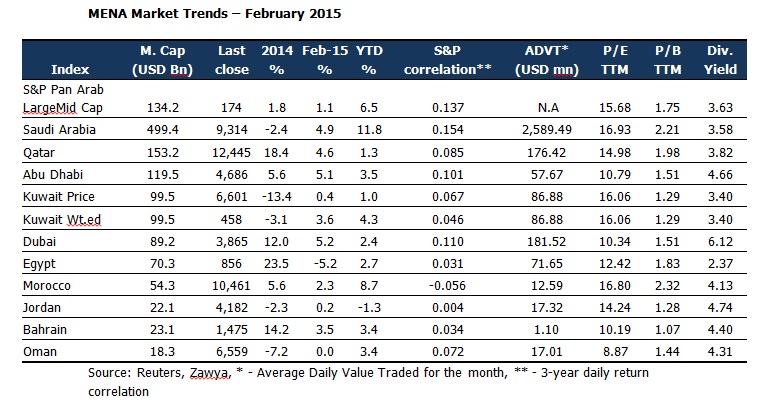_36.jpg)
Kuwait Financial Centre “Markaz” recently released its Monthly Market Research report. In this report, Markaz examines and analyzes the performance of equity markets in the MENA region as well as the global equity markets for the month of February.
The report pointed out that Kuwaiti weighted and price indices rose by 3.6% and 0.4%, respectively, supported by the rise in crude prices. The Kuwaiti bourse rallied in February, with some blue chips luring investors by declaring large cash dividend distributions.
The report stated that MENA markets ended February in green, as brent crude rose 18%. Egypt (-5.2%) was the only index that ended the month in red, while the top performing markets for the month were Dubai (5.2%), Abu Dhabi (5.2%), and Saudi Arabia (4.9%). The S&P GCC index closed the month at 124 points, registering a 4.4% in February and 7.3% YTD rise.
The report added that UAE markets seemed to recover from the bearish trend, and find a “new normal”, as the Dubai Financial Market registered a 5.2% increase in February, on the back of oil price rebound and good performance of property stocks. The Abu Dhabi bourse surged 5.2% on the back of Etisalat, the country’s largest telecommunications firm, posting a 9% increase for the month of February. The company announced a net profit of USD 572mn for the fourth quarter of 2014, which is a 45% YoY increase, driven by strong performance of domestic operations and successful acquisition of 53% stake in Maroc Telecom. Saudi CMA announced that it is on track to opening up its markets to foreign investors in the first half of this year, a move that is expected to catapult the Tadawul into the MSCI emerging markets index. Egypt stock market fell in February, as political uncertainty, coupled with poor Q4 results lead to a sell-off in the markets.
Markaz report also stated that Brent crude posted an 18% increase in the month, closing at USD 63 per barrel. According to Saudi Arabian Oil Minister, the global demand for oil is growing, as oil continued to trade at above USD 60 for a large part of the month. Gasoline demand in the US alone grew by almost 500,000 barrels a day in January, due to cheaper prices. Increasing demand from European refineries, and supply disruption in Libya has hastened the rise of Brent crude.
The report added that Blue chips had a positive month as nearly all ended the month in green. Saudi Electric (Saudi Arabia) was the top performer among the blue chip stocks in the region, recording a 22% increase, after announcing a bonus payment of USD 150-200mn, following a royal decree. Shares of Kingdom Holding (Saudi Arabia) rose 17% in February, as the company indicated its plans to sell shares in a significant number of private companies in local and international IPOs. Emaar Properties (Dubai) also rose by 13%, after posting a 28% increase in yearly earnings. Zain (Kuwait) rose 11.5% in the month of February, as Kuwait and Sudan entered into talks to help repatriate USD 280mn from Sudan, sometime in 2015.
S&P Ratings and Outlook changes in the Gulf region
In what is seen as the biggest changes made by a ratings agency in the Gulf region, Standard & Poor's cut ratings and outlook of several oil producing countries in the Middle East, including Saudi Arabia and Bahrain, citing the recent sharp decline in oil prices. Crude oil prices have plunged since June, reacting to rising global output at a time of slowing demand, although they have recovered partially in the last few weeks. The ratings agency slashed forecast for average Brent oil price to USD 55 per barrel for 2015, from its earlier forecast of USD 105. S&P downgraded Bahrain’s long-term and short-term foreign and local currency sovereign rating to BBB-/A-3 from BBB/A-2, and Oman’s rating to A-/A-2 from A/A-1, based on medium-term oil price assumptions. It also changed its outlook for Saudi Arabia to negative, while affirming its rating for the world’s biggest oil exporter. The rating agency also affirmed the ratings for Abu Dhabi and Qatar, citing their strong external and fiscal buffers as defenses against the oil price drop.
Seven of the 9 MENA sovereigns are rated investment grade, while Egypt, Jordan (hydrocarbon importers) are speculative grade. According to IMF, All Arabian Gulf countries, except Kuwait, will post fiscal deficits this year, and it estimates that the 6 GCC countries will collectively lose USD 300bn in oil revenues. The downgrade of Oman and Bahrain will make it more expensive for them to borrow, and make it difficult for them to narrow their widening fiscal deficits.

###
About Kuwait Financial Centre “Markaz”
Kuwait Financial Centre K.P.S.C “Markaz”, with total assets under management of over KD 1.08 billion as of December 31, 2014, was established in 1974 has become one of the leading asset management and investment banking institutions in the Arabian Gulf Region. Markaz was listed on the Kuwait Stock Exchange (KSE) in 1997.
For further information, please contact:
Osama Al Musallam
Senior Officer
Media & Communications Department
Kuwait Financial Centre K.P.S.C "Markaz"
Tel: +965 2224 8000 ext 1819
Dir: +965 2224 8075
Fax: +965 2241 4499
Email: [email protected]
www.markaz.com

